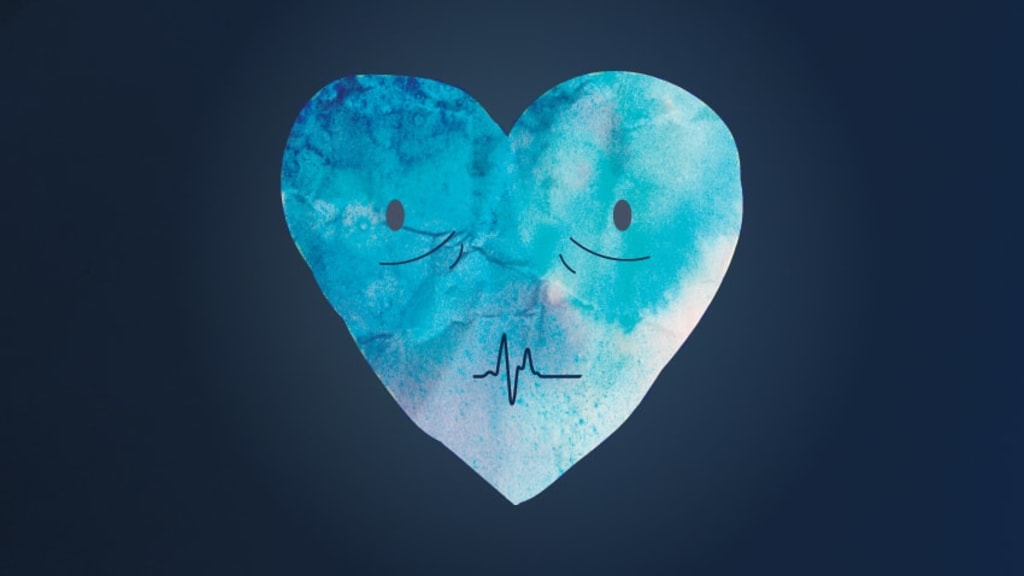The Darker Side of Love
Loving Someone with Depression

Our relationship started off like all amazing relationships do. We couldn't get enough of each other, counted down the seconds until we could be in each other's arms again, constantly talked about each other.
He was everything I wanted in a partner. Intelligent and interesting, with an unquenchable thirst for life, and an unceasing curiosity about the world. He was also a good deal older than me (17 years), and so his wealth of life experience often had me in awe. But what I loved most was that we had such respect for one another, something I had never really experienced in a relationship before; despite the age difference, we were always very much equals.
Things were going very well for a few months. We quickly realised that despite the age gap, our values were aligned, we wanted the same things from life, we had similar interests. He taught me so much about food, wine, culture, language. We planned a holiday together, spoke about our future together, planned where we would move in the world. We even spoke about having children one day.
Then, quite suddenly, everything changed. A well known friend of his committed suicide, and my partner found out through the media. I have never seen anyone so shaken to their core. The death of this friend, who had been my partner's mentor and inspiration in his profession as a chef, completely shattered his world as he thought he knew it. To begin with, I thought it was just the shock; but as time wore on, he began to say troubling things, like: "If he couldn't be happy, after everything he had achieved, everything he had seen, and everything he had, then what chance do I have?"
In them first days, I tried to be there for him as much as possible. He would appear to get better one day, but then tell me how empty and lost he felt the next. I was staying over at his house far more, hardly returning to my own apartment, save to get clean clothes occasionally. My knee-jerk reaction to his downward spiral was to smother him with my love and company, cook him dinner, get a nice bottle of wine, suggest trips out—all of which he was completely disinterested in.
I could feel the wall being built between us, brick by brick. I'd ask if he wanted me to come over that night, which, when we were first seeing each other, would be met with a "I always, always want to see you!" Just a few months down the line, however, all I would get was, "Up to you, don't care." We were never intimate anymore. He would never ask about my day, or about my life in general. This fiercely independent man, who had moved to multiple foreign countries on his own, who had had such an active social life, and whom I so admired, was suddenly spending the entirety of his days off work stuck inside playing video games or watching TV. His house was a mess, he stopped washing his clothes, stopped shaving and getting his hair cut. The warning signs were all there early on, but being in such close proximity, and watching it develop over time, they passed me by.
We spoke a lot about how he was feeling, which would usually get the same response: "I feel lost." He knew that his job wasn't fulfilling him and making him extremely stressed, but it went deeper than that. Since moving from his home in Argentina aged 20, he had moved to Spain, England, California, back to Argentina, then back to England again. He had sent money to family as he was worried about them. He felt like he had no roots. But it always came back to this point of his friend's suicide, and how would he ever be happy.
After a couple of months of this, I stumbled across an article on how to spot depression. As I was reading the symptoms, the panic slowly rose inside me as I realised that I had been completely unaware that he had been depressed this entire time. I sat in my office at work and broke down; I felt like I'd failed him in some way, and that I'd not done enough. Trying to compensate in some way, I read hundreds of articles on how to support someone with depression, and came up with a way I could bring up the subject, without flouting Rule 101 of talking to someone about their depression: Do not tell them they are depressed.
I managed to delicately bring up the subject of how he'd been feeling, mentioning the state of his house, how he hadn't really been going out, how his symptoms had been manifesting themselves physically in the forms of migraines, aches, and extreme fatigue. His immediate response: "I'm not depressed or anything!" He flat-out refused my offer to try and get him counselling to begin with, but after a lot of coercion and (I'm sorry to say) begging on my part, he reluctantly agreed to give it a try.
By this point, we hadn't actually been together for that long—no more than 5 or 6 months—but it felt like years. I was staying with him non-stop, constantly asking how he was, if he wanted anything, turning down social activities with my friends for fear of him doing anything to himself. I was not living the life of a normal 23 year-old. The climax of this rapidly deteriorating situation was the phone call I received from him one Sunday morning, telling me that he had collapsed at work, and I needed to come and get him to take him to hospital. I drove like a woman possessed, got him to A&E, where we waited for seven hours to be told that it was probably stress related, and he needed to take some time off work.
Around this time, it all began to get too much for me. It had been heading in this direction for some time, and, like a freight train colliding with a wall, the weight and severity of the situation hit me all at once. It had been clear to my friends and family for a while that I was pouring my everything into helping my partner, and not focusing on myself at all. It was as though I now only existed as an extension of him: his PA, his cleaner, his carer, his emotional crutch. I was sorting doctors' appointments, writing emails to his boss, cooking for him, doing his washing, constantly worrying about his wellbeing, advising him to do different activities to help himself—and what was I receiving in return? Indifference, mostly, interspersed with blow-by-blow accounts of the atrociousness of his work day, and how ill he felt.
Things very briefly got better as I started taking more time for myself. I began staying in my house more and more often, doing things on my own, and being there for him from a distance, but not under his skin as I previously had been. The space helped him, too; in hindsight, the dynamic of our relationship had become victim and saver, and my suffocating, frantic love was only serving to enable him, rather than do any good. While I was always willing to support him, he had become dependent on me, so rather than supporting him, I was carrying him. As we were spending more time apart, I realised the more time I spent away from him, the better I felt—a weight was lifted from me, I felt freed from the manacles around my wrists, and, for the first time, it dawned on me that I didn't actually owe him anything.
Our relationship never recovered from the strain that had been put on it for all them months, despite his depression lifting. Something had shifted irrevocably. We went on holiday, and I knew from the off that it would be make or break. Unfortunately, it was ten days of bickering and disagreements, and rather than reconnecting with each other and rediscovering the people that we had fallen in love with, we realised that what we had had was now broken beyond repair, and the people we had loved were no longer there.
Despite this realisation that things were over, it still took some time for me to properly admit it and end things. Was I ready to relinquish the occasional cosy nights in with a bottle of wine, listening to jazz? Was it time to give up the evenings walking through the park, just chatting? As hard as it was to face up to this decision, it was the right thing to do. Not only had the people we loved changed, but what we wanted from life was different. He wanted to start a family and settle down, I wanted to move to some obscure corner of the world. However, this knowledge didn't make leaving any easier, or the pain any less.
I will always care for this man deeply; at times, he showed me what it really means to be loved, and he inspired me more than he will ever know.
About the Creator
P.O. Williams
I am a freelance writer, and I work at a charity for social change in Liverpool, UK.
I write because I believe that writing can change things, I write to make a feeling into something tangible, and I write because I love it.






Comments
There are no comments for this story
Be the first to respond and start the conversation.